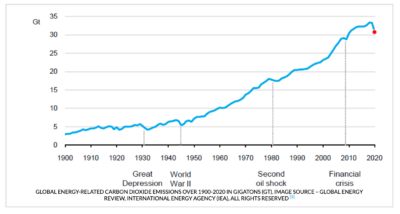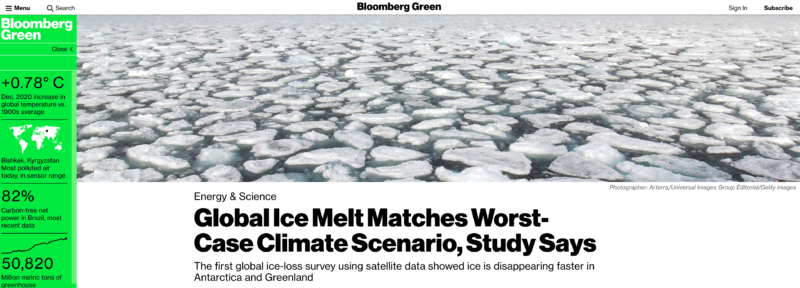Paris Climate Accord: Good, Bad, or Ugly?
My blog post last week pointed out a grossly misleading headline, “Global Warming Could Stop Quickly After Emissions Go To Zero.” As I explained, we do not even have a plan for how to get close to zero emissions. The vague plans being discussed aim for zero emissions by the year 2050 or decades beyond. As shown in this graph from the International Energy Agency, even with the industrial and travel slowdown from Covid-19, there has only been a slight slowdown of carbon dioxide emissions, the cause of the warming.
There was great excitement last week when President Joe Biden started the process to rejoin the Paris Climate Accord. I echo the congratulations — but that is only the first step, and easily misunderstood in its significance.
There are several ways to view the accord: GOOD is my support of setting a specific goal to halt runaway planetary warming; the BAD, refers to the agreement only setting voluntary, rather vague goals to reduce greenhouse gas emissions; the UGLY is that even if the goals were magically met, we would still at least double the amount of abnormal heating that has become evident in recent years.
It’s that heat that is causing the polar ice caps to melt, changing our weather, melting the glaciers, raising sea level, causing more wildfires, heat waves, etc. So, contrary to public perception, the Paris Climate Accord is not at all a solution to the worsening climate crisis. It’s a very modest and tepid resolve, but at least it’s a starting point. As the famous quote from Lao-Tzu says, “A journey of a thousand miles begins with one step.”
The task ahead of us is daunting, even unprecedented. But just as if we had let our personal fitness, weight or finances get way out of control, the first step to recovery is… taking the first step. Good things can follow once we commit to changing course. As we enter this new year, this new decade, and this URGENT search for a path to live in balance with our climate system, we must be positive… and realistic. On this journey to stop the rising temperature and to eventually lower the temperature, we will have to make some profound changes and innovations.
The path is not yet completely clear, but the start is.
You can take personal steps to reduce your contribution to greenhouse gas emissions such as driving less, less airplane flights, buying an electric car, etc. Those personal actions allow us to feel like we are contributing; they do set good examples and can have impact if followed by millions of others. But given how energy consumption is woven throughout the diverse societies of nearly eight billion people, we need to find new ways to scale far beyond the effects of individual action.
Obviously regulations will be required. Among the many types of policy and regulation, economic incentives to transition off fossil fuels on an urgent basis can be one of the most effective ways to achieve change. I believe that millions of free market decisions are an important vehicle to achieve that goal. Quite a number of organizations now advocate some form of carbon tax or carbon price incentive as a way to shift energy patterns at scale. In other words, if we make fossil fuel use increasingly expensive, and subsidize or create rebates for renewable energy usage, we can cause vast change much faster than by individual actions. These increased carbon taxes, or fees, can be offset by reduction of other taxes, such as income and sales tax. Leading organizations promoting political support for “carbon pricing” include:
- Citizens Climate Lobby www.citizensclimatelobby.org has likely been the most effective at promoting these concepts.
- 350.org www.350.org has focused on acceptance of the goal to get carbon dioxide levels back down to 350 ppm (parts per million) from the current 415 ppm
- There is even an “eco-right” Republican based organization, www.republicen.org
Each of their websites will give you additional information.
Looking at the News This Week…
This article from Bloomberg Green documents the ominous trends of increased ice melting in Greenland and Antarctica. To quote the lead:
“Melting on the ice sheets has accelerated so much over the past three decades that it’s now in line with the worst-case climate warming scenarios outlined by scientists. A total of 28 trillion metric tons of ice was lost between 1994 and 2017, according to a research paper published in The Cryosphere on Monday. The research team led by the University of Leeds in the U.K. was the first to carry out a global survey of global ice loss using satellite data. “The ice sheets are now following the worst-case climate warming scenarios set out by the Intergovernmental Panel on Climate Change,” lead author Thomas Slater said in a statement. “Although every region we studied lost ice, losses from the Antarctic and Greenland ice sheets have accelerated the most.”
To read the full article: https://www.bloomberg.com/news/articles/2021-01-25/climate-change-is-melting-ice-in-every-continent-new-study-shows
COMING NEXT WEEK: I will be sharing information about a special Fact-Finding trip to Greenland in late August.


